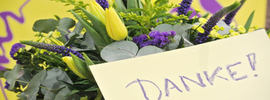29.2.2012 - NCR National Catholic Reformers
South Africa reformers, bishops pursue dialogue
CAPE TOWN, SOUTH AFRICA -- Talking and listening are what both South Africa’s year-old Catholic group seeking church reforms and the bishops’ conference say they intend to do in their new tentative relationship.
“It’s important for us to establish dialogue” with the Southern African Catholic Bishops’ Conference, “even if that takes a long time,” said Brian Robertson of We Are All Church, an organization of about 120 South African Catholics that is affiliated with the international We Are Church group.
Robertson, a retired psychiatrist who lives in Cape Town, and his wife, Francoise, are the national coordinators of the group, which says in its mission statement that it “upholds primacy of conscience, and the need for questioning and dialogue” and “openly addresses contemporary concerns such as priestly celibacy and women in ministry.”
We Are All Church “does not question dogma. We all accept that. What we want discussed are the practices that flow from that,” Robertson said in a Feb. 7 telephone interview from St. Helena, where he is working for two months in the tiny south Atlantic island’s hospital.
In November, We Are All Church wrote to the bishops’ conference, saying they “hope to be recognized as a group of Catholics in good standing who wish to promote the implementation and furthering of the renewal of the church that was begun” at the Second Vatican Council (1962-65).
Robertson said he may have moved too fast in 2011 when he approached both Archbishop Stephen Brislin of Cape Town and his parish priest to tell them about the new group and its aims.
Robertson said that Brislin told him the organization was “outside the church” and could not meet on church property. And when the time came for the annual recommissioning of ministers of the Eucharist in Robertson’s Cape Town parish, he found his name was not on the list.
While it is crucial that the institutional church in South Africa “takes seriously the concerns” of We Are All Church, a “problem is that the South African bishops can’t make decisions that affect the universal church,” said Fr. Ricardo Smuts, a theological advisor to the bishops’ conference.
“The demands in their manifesto cannot be met for South Africa because they are universal demands,” he said in a Feb. 13 telephone interview from St. John Vianney Seminary in Pretoria.
“But we can listen. And we will move with caution, prudence and due diligence,” Smuts said. Members of the theological advisory commission are scheduled to meet with bishops’ conference officials March 17 to discuss “how we will engage them [We Are All Church"> and address the issues that concern them,” he said.
The members of the organization, which has branches in Cape Town, Johannesburg and Durban, formed in November 2010. Members “are all devout, concerned Catholics who want dialogue. We don’t want to leave -- or trash -- the church,” Robertson said.
“We don’t want to force change,” he said, noting that the group is being careful not to say “anything that could be seen as grounds for rejection.”
However, the organization does “want the South African hierarchy to accept that without dialogue there will be a rift, and radicals will form a different church,” he said.
“The South African church is outspoken about human rights but our own house is not in order,” he said.
The main aim of the group is to “put across the ideas raised at the Second Vatican Council,” Robertson said, noting that the memory of the late Archbishop Denis Hurley of Durban, who was among 25 members of Vatican II’s agenda-setting Central Preparatory Commission, is an inspiration to We Are All Church.
“His motto is ours: ‘Where the Spirit is, there is freedom’ ” (Ubi spiritus, ibi libertas, 2 Corinthians 3:17), Robertson said.
Dialogue between the group’s leaders and the bishops is “very tentative and some bishops are not sure how best to do it,” Smuts said, noting that the talks were necessary to “give the lead to priests, some of whom are unsure how to engage in their parishes with these groupings.”
While We Are All Church is “very vocal in some sectors, particularly urban dioceses,” it does not “speak for the masses of the church and this is another reason for us to move with caution,” Smuts said.
White urban professionals, many retired, largely make up the organization.
“We’re hoping that this will change over time, as we grow,” Robertson said.
He said that talking with Catholics has often challenged his “assumption that most Catholics, especially bishops and priests, hold the views of the established church.”
“People often surprise us, saying, ‘We agree, we think like you do,’ ” he said. “We’re encouraging them to speak up.”
There is a “culture of fear” in the church, particularly in South Africa with its “legacy of apartheid,” Robertson said.
“People don’t feel free to say what they think. They seem to fear that if they do speak out they will get a negative reaction” from the church, he said.
Catholics in the Northern Hemisphere “have a confidence that we don’t have. They live in a culture where freedom of speech is highly prized,” he said.
The “way forward in dialogue” between South Africa’s bishops and We Are All Church will largely depend on the “tone of the initial meeting” between leaders of the group and representatives of the bishops’ conference, Smuts said, noting that he hoped there would be “a tone of willingness to listen and to compromise, rather than of demand.”
He noted that the conference has taken care to recommend bishops known for their sensitivity and diplomacy to take part in these early discussions.
[Bronwen Dachs is a freelance writer from Cape Town, South Africa.">

unbearbeitete GOOGLE-Übersetzung
von Bronwen Dachs
CAPE TOWN, Südafrika - Reden und Zuhören sind, was beide Südafrikas Jahre alte katholische Kirche Gruppe der Suche nach Reformen und die Bischofskonferenz sagen, sie wollen in ihrem neuen zaghaften Beziehung zu tun.
"Es ist für uns wichtig, den Dialog zu etablieren", mit der Südafrikanischen Katholischen Bischofskonferenz, "auch wenn diese sehr lange dauert", sagte Brian Robertson von We All Church, einer Organisation von rund 120 südafrikanischen Katholiken, die mit dem Unternehmen assoziiert wird, sind International Wir sind Kirche-Gruppe.
Robertson, ein pensionierter Psychiater, der in Kapstadt lebt, und seine Frau Francoise, sind die nationalen Koordinatoren der Gruppe, die in ihrem Leitbild sagt, dass es "hält Primat des Gewissens und die Notwendigkeit für Fragen und Dialog" und "offen greift aktuelle Probleme wie Zölibat und Frauen im Dienst. "
Wir sind alle Kirche "nicht in Frage stellt Dogma. Wir alle akzeptieren. Was wir wollen besprochen werden, sind die Praktiken, die sich aus, dass "Robertson in einem Telefon-Interview 7. Februar von St. Helena, wo er für zwei Monate Arbeit liegt in dem kleinen Südatlantik Insel Krankenhaus sagte.
Im November sind wir alle Kirche schrieb an die Bischofskonferenz, sagte sie "hoffen, als eine Gruppe von Katholiken in gutem Ansehen, die die Umsetzung fördern wollen und die Förderung der Erneuerung der Kirche, die begonnen wurde erkannt werden" auf dem Zweiten Vatikanische Konzil (1962-65).
Robertson sagte, er könnte zu schnell bewegt im Jahr 2011, als er sowohl Erzbischof Stephen Brislin von Kapstadt und seinem Pfarrer näherte, um sie über die neue Gruppe und ihre Ziele zu erzählen.
Robertson sagte, dass Brislin ihm gesagt, die Organisation sei "außerhalb der Kirche" und konnte sich nicht auf kirchlichen Eigentums zu treffen. Und wenn die Zeit für die jährliche Wiederinbetriebnahme der Diener der Eucharistie in Robertson Kapstadt Pfarrei kam, fand er sein Name war nicht auf der Liste.
Während es von entscheidender Bedeutung ist, dass die institutionelle Kirche in Südafrika "ernst nimmt die Sorgen" von We All Are Kirche, ein "Problem ist, dass die südafrikanischen Bischöfe keine Entscheidungen treffen können, die die universale Kirche beeinflussen", sagte Pater. Ricardo Smuts, ein theologischer Berater der Bischofskonferenz.
"Die Anforderungen in ihrem Manifest nicht für Südafrika erfüllt werden, weil sie universell Forderungen sind", sagte er in einem Telefon-Interview 13. Februar von St. John Vianney Seminar in Pretoria.
"Aber wir können zuhören. Und wir werden mit Vorsicht, Umsicht und Sorgfalt zu bewegen ", sagte Smuts. Die Mitglieder der theologischen beratende Kommission geplant sind, um mit Bischofskonferenz Beamten treffen 17. März zu diskutieren, "wie wir sie engagieren [We Are All Church"> und die anstehenden Themen, die Besorgnis ihnen", sagte er.
Die Mitglieder der Organisation, die Niederlassungen in Kapstadt, Johannesburg und Durban, im November 2010 gebildet hat. Mitglieder "sind alle fromm, besorgte Katholiken, die wollen den Dialog. Wir wollen nicht zu verlassen - oder Müll - die Kirche ", sagte Robertson.
"Wir wollen keine Änderung zu erzwingen", sagte er und bemerkte, dass sich die Gruppe darauf achten, nicht zu sagen, "alles, was als Grund für die Ablehnung gesehen werden konnte."
Allerdings ist die Organisation bedeutet "wollen die südafrikanische Hierarchie zu akzeptieren, dass ohne Dialog gibt es eine Kluft zu sein, und Radikale werden eine andere Kirche zu bilden", sagte er.
"Die südafrikanische Kirche ist offen darüber Menschenrechte, sondern unser eigenes Haus nicht in Ordnung ist", sagte er.
Das Hauptziel der Gruppe ist es, "über die Ideen auf dem Zweiten Vatikanischen Konzil erhoben bringen", sagte Robertson stellte fest, dass das Gedenken an den verstorbenen Erzbischof Denis Hurley von Durban, der unter den 25 Mitgliedern des II. Vatikanischen Konzils das war Agenda-Setting Zentral Vorbereitende Kommission, ist eine Inspiration für We Are All Kirche.
"Sein Motto lautet bei uns:" Wo der Geist ist, da ist Freiheit "(Ubi spiritus, ibi libertas, 2 Korinther 3:17), sagte Robertson.
Der Dialog zwischen der Gruppe Staats-und Regierungschefs und der Bischöfe sei "sehr zögerlich und einige Bischöfe sind nicht sicher, wie man am besten, es zu tun", Smuts, sagte der Feststellung, dass die Gespräche notwendig waren, um "geben die Führung an die Priester, sind einige von ihnen unsicher, wie sie engagieren in ihren Gemeinden mit diesen Gruppierungen. "
Während wir alle Kirche sind "sehr vocal in einigen Sektoren, vor allem städtischen Diözesen," es nicht "für die Massen von der Gemeinde zu reden und dies ist ein weiterer Grund für uns, mit Vorsicht zu bewegen", sagte Smuts.
Weiß Urban Professionals, viele Rentner, weitgehend bilden die Organisation.
"Wir hoffen, dass dies im Laufe der Zeit ändern, wie wir wachsen", sagte Robertson.
Er sagte, dass im Gespräch mit Katholiken hat oft seine herausgefordert "Annahme, dass die meisten Katholiken, vor allem Bischöfe und Priester, halten Sie die Ansichten der etablierten Kirche."
"Die Leute oft überrascht uns und sagen: Wir sind uns einig, wir denken wie du. '", sagte er. "Wir ermutigen sie zu sprechen."
Es gibt eine "Kultur der Angst" in der Kirche, vor allem in Südafrika mit seinem "Erbe der Apartheid", sagte Robertson.
"Die Menschen fühlen sich nicht frei zu sagen was sie denken. Sie scheinen zu befürchten, dass, wenn sie sprechen sie wird eine negative Reaktion "von der Kirche bekommen, sagte er.
Katholiken in der nördlichen Hemisphäre "haben eine Zuversicht, die wir nicht haben. Sie leben in einer Kultur, wo Redefreiheit hoch geschätzt wird ", sagte er.
Der "Weg nach vorn im Dialog" zwischen südafrikanischen Bischöfe und wir alle sind Kirche wird weitgehend von der "Ton der ersten Begegnung" zwischen Staats-und Regierungschefs der Gruppe und Vertretern der Bischofskonferenz ab, sagte Smuts und bemerkte, dass er hoffte, es würde sein ", ein Ton der Bereitschaft zuzuhören und Kompromisse einzugehen, anstatt der Nachfrage."
Er wies darauf hin, dass die Konferenz ist darauf zu Bischöfen für ihre Sensibilität und Diplomatie bekannt, an diesen Diskussionen zu beteiligen empfehlen früh genommen.
http://ncronline.org/news/global/south-africa-reformers-bishops-pursue-dialogue
Zuletzt geändert am 02.03.2012


